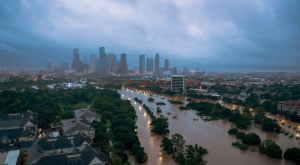Storms are more intense and more frequent; so are droughts. Everywhere is getting hotter. When it comes, rainfall is more intense.
The direct impacts of climate change on workers’ comp are pretty obvious:
- higher risk for public safety workers;
- increasing heat exposure and associated risks for agriculture, construction, forestry and other “outside” workers;
- more infrastructure and construction work and associated payroll to rebuild and adapt
[Jeff Rush from California Joint Powers, Louisiana Work Comp Corporation’s Jill Leonard and I will be talking about climate change’s impact on workers’ comp at the National Comp Conference in Vegas) – mark your calendar for 12:30 on Thursday October 20.]
Thinking about this, there are both acute and chronic issues at hand; Fire, flood, and storm are acute events. This requires a crisis management approach; anticipate, prepare, triage, respond, recover.
Heat is different – it is chronic; unlike events it is pervasive, consistent, slowly increasing. This requires a more traditional risk management approach; assess, evaluate impacts, plan, educate, train, monitor, report, improve.
There are other hidden impacts, ones that payers would do well to think through.
For example…let’s use Hurricane Harvey which hit southeast Texas in 2017 causing $125 Billion in economic damage. As human-caused climate change increased Harvey’s severity by 30%; climate change’s added cost ran well into the tens of billions for that one storm alone. For a very detailed discussion of this see here.

photo credit CNN.com
Research published in the Harvard Business Review found:
- 90% of businesses in the area surveyed by the researchers lost revenue due to Harvey;
- 40% of businesses experienced property damage of which
- over a a quarter were closed for a month, and
- one out of eight were closed for more than three months.
Think about the – 1/8th of businesses are closed for more than a quarter, a time when payroll is likely non-existent – or close to it.
No payroll, no premiums.
Well, you may say, insurance covered that.
Nope – only 15% of surveyed firms got a payment – of any kind – from insurance.
What does this mean for you?
The more you think about human-cause climate change, the more impact you find.


